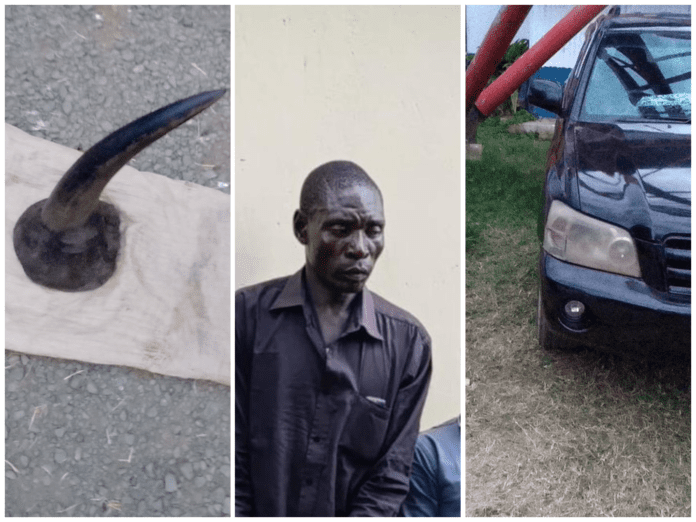Police in Homa Bay have arrested three individuals, including a Kenya Defence Forces (KDF) sergeant, after they were found in possession of a rhino horn valued at Sh2.9 million.
The horn, weighing 2.9 kilograms, was seized during a multi-agency operation on New Year’s Eve at Rodi Market. According to police and Kenya Wildlife Service (KWS) officials, intelligence reports had indicated that the suspects were planning to sell the wildlife trophy.
The suspects, traveling in a private black car, were apprehended at a hotel in Rodi Kopany Trading Centre, on the outskirts of Homa Bay Town, Homa Bay County Directorate of Criminal Investigation (DCI) commander Peter Kimulwo confirmed.
In addition to the rhino horn, police also impounded the vehicle believed to have been used to transport the trophy. Investigators suspect the horn was sourced from Ruma National Park, a protected wildlife reserve.
Commander Kimulwo noted that the arrests are part of ongoing efforts to dismantle a poaching syndicate operating in and around Ruma National Park. Authorities are pursuing other suspects linked to the network.
The three individuals will face charges under Section 92(4) of the Wildlife Conservation and Management Act 2013 for possession of wildlife trophies from an endangered species. Officials emphasized that the recovery indicates a rhino had been killed despite stringent measures to combat poaching.
Rhino horns and elephant tusks are highly sought after in the black market, primarily in Asia and the Middle East, where they are used in traditional medicine and to create ornaments. The illegal ivory trade remains a significant threat to Africa’s wildlife, with Kenya often serving as a transit route for ivory bound for international markets.
Kenya has implemented various strategies to counter poaching, including high-tech surveillance equipment like drones, community education, inter-agency collaborations, and intelligence-led operations. These measures have yielded significant results, including a milestone achievement of zero rhino poaching in 2020—the first such instance in nearly two decades.
In a symbolic move on April 30, 2016, Kenya destroyed 105 tonnes of elephant ivory and 1.35 tonnes of rhino horn to signal its commitment to ending the illegal wildlife trade.
Despite these efforts, challenges persist, with authorities remaining vigilant in their fight to protect endangered species.







